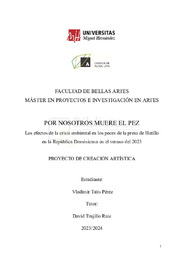Please use this identifier to cite or link to this item:
https://hdl.handle.net/11000/32604Full metadata record
| DC Field | Value | Language |
|---|---|---|
| dc.contributor.advisor | Trujillo, David | - |
| dc.contributor.author | Tatis Pérez, Vladimir | - |
| dc.contributor.other | Departamentos de la UMH::Arte | es_ES |
| dc.date.accessioned | 2024-07-22T11:13:59Z | - |
| dc.date.available | 2024-07-22T11:13:59Z | - |
| dc.date.created | 2024-06-13 | - |
| dc.identifier.uri | https://hdl.handle.net/11000/32604 | - |
| dc.description.abstract | POR NOSOTROS MUERE EL PEZ es el trabajo de fin de máster que presentamos como proyecto expositivo para la convocatoria ARTE EN LA CASA BARDÍN del Instituto Alicantino de Cultura Juan Gil-Albert. Con este proyecto pretendemos llevar a cabo una serie de obras artísticas: fotografías, videoarte, site-specific, instalaciones y escultura construidas desde la idea de la hibridez y sustentado en la práctica interdisciplinar. Abordando el tema de la crisis ambiental y elegimos la contaminación por plástico de un solo uso en la presa de Hatillo en la República Dominicana como telón de fondo. Este proyecto no solo destaca la importancia de abordar la contaminación plástica, sino que también se alinea con los objetivos del Instituto Alicantino de Cultura Juan Gil-Albert de promover la creación artística de la provincia de Alicante en la convocatoria ARTE EN CASA BARDIN. A través de este proyecto, buscamos involucrar al público en un diálogo sobre la crisis ambiental y la adopción de prácticas sostenibles, aprovechando la oportunidad de mostrar lo aprendido en el máster en un entorno de alto nivel profesional. Este máster en proyecto e investigación en arte, nos permite practicar con herramientas y recursos artísticos con altísimo nivel de profesionalidad en el cual se puede hibridar diferentes disciplinas artísticas como la investigación, la escultura, el audiovisual, el performance y la instalación. Este trabajo conlleva un laborioso proceso de investigación, aprendizaje, experimentación y elaboración para mostrar lo aprendido. Teniendo así la posibilidad de comunicar nuestras inquietudes con los efectos negativos que provoca el uso irresponsable de los plásticos. Muchos y muchas de nuestros maestros han sido seleccionados para exponer sus obras en esta sala expositiva. Nos proponemos continuar por esos caminos asumiendo este desafío. Qué mejor espacio para trabajar esta exposición que La Casa Bardín. Realizaremos estas piezas artísticas reusando materiales de desechos de un solo uso como botellas, huacales y bolsas plásticas; naturales, no comerciales, inspirados en el movimiento artístico "Arte Povera" y así potenciar la transformación de esos materiales, no comerciales, en piezas artísticas que nos ayuden a crear conciencia sobre la crisis ambiental que atravesamos. | es_ES |
| dc.description.abstract | POR NOSOTROS MUERE EL PEZ is the master's thesis that we present as an exhibition project for the call ARTE EN LA CASA BARDÍN of the Instituto Alicantino de Cultura Juan Gil-Albert. With this project we intend to carry out a series of artistic works: photographs, video art, site-specific, installations and sculpture built from the idea of hybridity and based on interdisciplinary practice. Addressing the theme of the environmental crisis, we chose the single-use plastic pollution in the Hatillo dam in the Dominican Republic as a backdrop. This project not only highlights the importance of addressing plastic pollution, but also aligns with the objectives of the Instituto Alicantino de Cultura Juan Gil-Albert to promote artistic creation in the province of Alicante in the call ARTE EN CASA BARDIN. Through this project, we seek to engage the public in a dialogue about the environmental crisis and the adoption of sustainable practices, taking advantage of the opportunity to show what was learned in the master's degree in a high-level professional environment. This master's degree in project and research in art, allows us to practice with artistic tools and resources with a high level of professionalism in which different artistic disciplines such as research, sculpture, audiovisual, performance and installation can be involved. This work involves a laborious process of research, learning, experimentation and elaboration to show what we have learned. Thus having the possibility to communicate our concerns with the negative effects caused by the irresponsible use of plastics. Many of our masters have been selected to exhibit their works in this exhibition hall. We intend to continue along these paths by taking on this challenge. What better space to work on this exhibition than La Casa Bardín. We will make these artistic pieces reusing single-use waste materials such as bottles, crates and plastic bags; natural, non-commercial, inspired by the artistic movement “Arte Povera” and thus enhance the transformation of these materials, non-commercial, in artistic pieces that help us raise awareness about the environmental crisis we are going through. | es_ES |
| dc.format | application/pdf | es_ES |
| dc.format.extent | 43 | es_ES |
| dc.language.iso | spa | es_ES |
| dc.publisher | Universidad Miguel Hernández | es_ES |
| dc.rights | info:eu-repo/semantics/openAccess | es_ES |
| dc.rights.uri | http://creativecommons.org/licenses/by-nc-nd/4.0/ | * |
| dc.subject | Contaminación | es_ES |
| dc.subject | Casa Bardín | es_ES |
| dc.subject | Presa de Hatillo | es_ES |
| dc.subject | Crisis Ambiental | es_ES |
| dc.subject | Arte Povera | es_ES |
| dc.subject.other | CDU::7 - Bellas artes | es_ES |
| dc.title | Por nosotros muere el pez: Los efectos de la crisis ambiental en los peces de la presa de Hatillo en la República Dominicana en el verano del 2023 | es_ES |
| dc.type | info:eu-repo/semantics/masterThesis | es_ES |

View/Open:
TFM Tatis Pérez, Vladimir.pdf
1,7 MB
Adobe PDF
Share:
.png)
